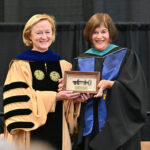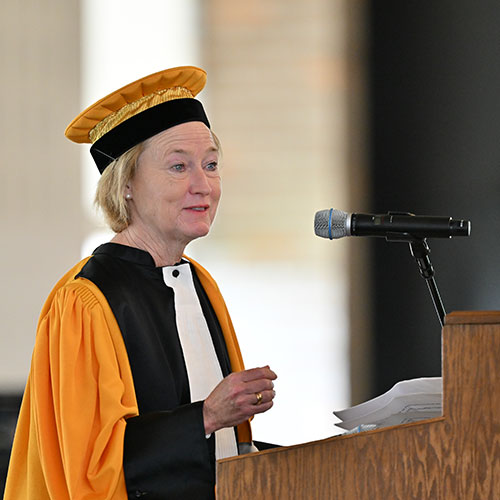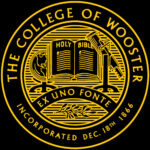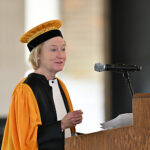
President McCall addresses the College community to convene the 154th academic year

President Anne E. McCall delivered the following address on Thursday, Aug. 17 as part of The College of Wooster’s 154th Convocation.
Coming together for today’s Convocation, wearing clothes that are not part of our daily wear, in a ceremony that sits outside our normal schedule, we celebrate our purpose and dedicate ourselves to it. This may sound like much pomp and perhaps little circumstance, but we do well to honor the journey we undertake through explored regions of the mind, society, and world into unknown regions that you have the ability to understand and the power to help others see.
Our purpose at the College is time-honored across millennia and continents: learning, being, and becoming. For those of you who have just arrived, you have inserted yourselves here at The College of Wooster into a storied and on-going history of transmission, a process of acquiring time-honored knowledge, honing skills, and developing habits of the mind.
In equal measure and whether you know it already or not, you are becoming part of a history of challenging the very knowledge we teach, of complicating and contradicting what may pass for truth, of questioning what you may think is true today but perhaps not tomorrow. The gowns that we wear are largely medieval in design; don’t confuse their age with nostalgia or complacency, rather, they unite us with each other and bind us with those before us who sought to know, imagine, create, become.
For those of you who are embarking on your Senior I.S. journey, the same is true, with a deadline. Your purpose is to bring to bear all the skills you’ve learned here – and to learn some more – to create new art, new understandings, new knowledge; to map out solutions to problems, to recognize problems that need a name so we can begin working on them; to become sources for others in bibliographies and CHATGPT. Embrace this challenge; you will provide irrefutable evidence to yourself and others of what you can do.
Our new students know that I want all of you to be dangerous. That sounds glamorous, and in a certain way, it is. There is a thrill to discovery and disclosure, a rush that comes from getting ideas out into the realm of public debate. New ideas, processes, and works of imagination, however, do not suddenly emerge whole between classes; they take time to be researched, communicated, debated, tested, and refined, refuted, or accepted. They take years of grunt work and, more humbling or disheartening sometimes, their potential acceptance and adoption can easily take time that extends beyond the span of our own individual lives. It is logical to wonder if this long work is worth the effort. On the other hand, consider how hard people try to restrict education, to suppress or limit the sharing of knowledge, to hide it rather than confront it, with evidence. Examples are legion across centuries and cultures. Allow me to share a few examples that are meaningful to me:
George Sand, a prolific novelist who was extremely popular throughout the nineteenth century might strike you as mainstream. And yet, the claims she made over decades on behalf of women, workers, democracy, economic justice and freedom earned her censorship, attention from authorities, and denunciations: clams that she was dangerous. Her entire literary corpus was put on the Index by the Catholic Church, the French Senate banned all but a few of her novels from their equivalent of municipal libraries (les bibliothèques populaires).
On our side of the Atlantic, I think of Jane Addams, co-founder of Chicago’s Hull House in 1889. She did not do this alone or out of the blue; she studied reformer initiatives elsewhere, got advice, collaborated, experimented. One of the many things that Addams did was engage in what we might now call inclusive community building, organizing events that highlighted the intricate weavings of immigrant women and framed these low-status citizens as knowers, creators in part to combat the shame experienced by their children. Addams, who had spent several years exploring her path in the early years of adulthood eventually became the first President of the National Conference of Social Work and was a Nobel Peace Prize winner. She was also famously decried as “the most dangerous woman in America.”
Closer to us, take ‘structural racism’ and ‘health disparities,’ concepts that are the object of study, action, and legislation today. W.E.B. DuBois, himself an object of investigation and prosecution, contributed to the future creation of these concepts when, in 1899, he wrote about the racially disparate outcomes of disease in Philadelphia. He did this after spending 18 months administering surveys and spending more time studying them. That was 124 years ago, and we continue refining these ideas that we now use to mitigate social determinants of health, at least in places where it is lawful to teach them.
We have, finally, our own example, here at the College of Wooster, in the person of Dr. Horace Mateer, the man for whom Dr. Sharon Lynn’s professorship is named. In 1881, only eleven years after The College of Wooster opened, this physician was teaching evolutionary theory in his biology course. You may associate Darwin and evolutionary theory with a distant and immobile past, since his face forms a medallion in our now historic Timken Science Library, inaugurated in 1900. If that is what you think, think again. These were fighting words and concepts, banned in most colleges with religious affiliations. Dr. Mateer himself wrote that he had been opposed to the theory until he read, studied, and reflected on it. Note that I am more interested yet in the process than in the result. In any event, so controversial were these ideas that in 1922, Wooster students packed Memorial Chapel to listen to the former Secretary of State and presidential candidate, William Jennings Bryan, speak against it. One year later, Wooster risked being defunded by its church sponsor for continuing to allow that teaching.
This is all to say that for you to be dangerous the way I mean it, in a way that matters, you have come to the right place. Identifying as a student at The College of Wooster means accepting an inheritance that is a challenge, a challenge to continue a tradition of unflinching intellectual and artistic inquiry, a history of risk-taking through detailed processes of research, discovery, disagreement and debate, correction, revision, and dissemination. We do this individually, working together. Faculty, staff, fellow students, and alumni are all here to support you, as you do for others.
Once you’ve enriched this inheritance with your own contributions, you’ll pass that heritage on whole, with interest, to students who will accept their own challenge long after you’ve left our campus. So let’s get to work; we are all counting on you. Go Scots!
Posted in President McCall on August 18, 2023.


